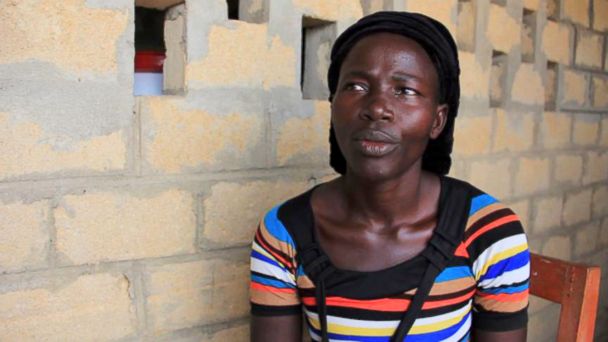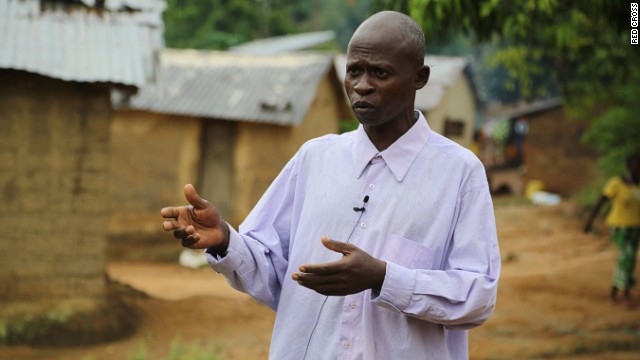 |
| Tawa Tamba |
The Ebola outbreak in West Africa has claimed the lives of at least 673 people in Guinea, Liberia Sierra Leone and Nigeria but two person who survived
the virulent disease is shedding light on what it's like to battle the
virus.
There is no cure or vaccine to treat Ebola, but the aid agency MSF has
shown it doesn't have to be a death sentence if treated early. Ebola
typically kills 90% of patients but the death rate in this outbreak has
dropped to roughly 60%
Read Tiwa Tamba from Liberia And Saa Sabas from Guinea Story After The Cut
Tawa Tamba, a mother of three in Liberia, was recently discharged after fighting off the potentially fatal disease.
Tawa's husband became very ill and died about four weeks ago. Tawa then went to a clinic run by the group Samaritan's Purse when one of her children fell ill with symptoms similar to that of her husband's.
Two of her children died, and she herself became very sick, according to Dr. Azaria Marthyman of Samaritan's Purse.
Tawa eventually recovered and was discharged on July 20.
"Tawa expressed her gratitude to God foremost and to all those who helped," Marthyman wrote in a blog post on the group's website.
"Thank you for praying for me every time you treated me!" Tawa told the staff, according to Marthyman.
 |
Saa Sabas from Guinea spoke to CNN and see their conversation below:
How did you contract Ebola?
I am an agronomist and I
have two children, one boy and one girl. I work in the pharmacy at the
health center of Gueckedou in southern Guinea.
When my father was hospitalized at the health center I naturally volunteered to be at his bedside so other family members would not have to make the daily trek of tens of kilometers, traversing the trails between their village and the facility. I cleaned him when he vomited and also did his laundry. I also often gave him food and drink. He had diarrhea at least eight times per day but I did not know he was suffering from Ebola.
When my father was hospitalized at the health center I naturally volunteered to be at his bedside so other family members would not have to make the daily trek of tens of kilometers, traversing the trails between their village and the facility. I cleaned him when he vomited and also did his laundry. I also often gave him food and drink. He had diarrhea at least eight times per day but I did not know he was suffering from Ebola.
Five days after being
hospitalized, [my father] passed away. After his death the medical staff
realized he had presented Ebola symptoms and as I had close contact
with him, it meant that I was at risk. So they told me that I needed to
be followed up for 21 days and if ever I felt a small fever I had to
come to the health center. The countdown then started for me: after nine
days I got fever and this persisted until the 11th day.
Finally I went to the treatment center -- where I did an Ebola test which was positive.
Finally I went to the treatment center -- where I did an Ebola test which was positive.
What were the symptoms? How did you feel while you were ill?
I first got a fever which
persisted. My body temperature reached nearly 40C (104 degrees
Fahrenheit).
After that I had diarrhea, vomits, dysentery and hiccups [all symptoms of Ebola]. I went to the toilet several times a day and I felt so tired and uncomfortable.
After that I had diarrhea, vomits, dysentery and hiccups [all symptoms of Ebola]. I went to the toilet several times a day and I felt so tired and uncomfortable.
How and where were you treated?
I received medical
assistance at the Ebola treatment center, put in place at the health
centre of Gueckedou.
The medical staff provided me with oral medications and infusions. They also provided me with food. I suffered at lot in the beginning with diarrhoea and hiccups but with the treatment I started to feel better.
The medical staff provided me with oral medications and infusions. They also provided me with food. I suffered at lot in the beginning with diarrhoea and hiccups but with the treatment I started to feel better.
What was the initial reaction in your home village after you recovered?
Joy, for my family
because everyone thought that I would not survive this disease as many
others people had died. However before the medical staff released me to
go back to my family they tested me three times to make sure that I
really had recovered.
Afterwards they gave me a certificate of discharge. They also visited my family, the leaders and elders of my community to inform them that I had recovered and I was no longer contagious. Despite this, I was stigmatized.
Some people avoided me in the beginning but now, over time, they have learned to accept me. Now they call me "anti-Ebola."
Afterwards they gave me a certificate of discharge. They also visited my family, the leaders and elders of my community to inform them that I had recovered and I was no longer contagious. Despite this, I was stigmatized.
Some people avoided me in the beginning but now, over time, they have learned to accept me. Now they call me "anti-Ebola."
Some people avoided me in the beginning but now, over time, they have learned to accept me. Now they call me 'anti-Ebola'
You're now working with Red Cross volunteers in Guinea to raise awareness of the disease: what lessons are passing on?
I am part of a team of
Red Cross volunteers, visiting communities, raising awareness on how to
prevent the spread of the disease. One of the messages I try to pass on
to the communities is to go early to the health center when sufferers
first feel symptoms.
The treatment is free of charge. People there will give you food and clothes and you can get a chance to survive.
The treatment is free of charge. People there will give you food and clothes and you can get a chance to survive.
What's your message for the outside world about Ebola? How can they help?
Everyone should be
mobilized. We need to educate people and increase the sensitization.
This is the key to stop the dangerous disease Ebola.
Many people have already died, that is why I participate in activities [to educate people]. I urge people to go the isolation and treatment centres if they experience the earliest symptoms of the disease, to increase their chance of being cured and surviving.
No comments:
Post a Comment